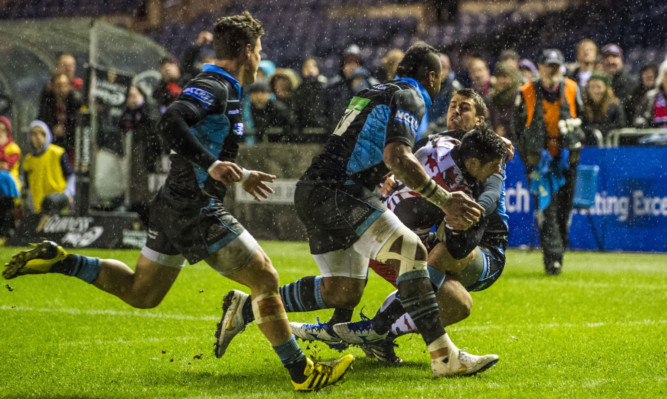More of the same wouldn’t do? It looked just fine for Edinburgh as they again toughed out the victory in the 1872 Cup second leg, conveniently moved to their home at BT Murrayfield.
Does the first double triumph for 12 years for the capital side marks a sea-change in the relationship between the two teams? How does this all affect the forthcoming 6 Nations?
Here’s some further musings on the second game and the month ahead
WHAT SHOULD EDINBURGH BE AIMING AT?
Alan Solomons said on Saturday the team’s target was a top six finish in the PRO12, which of course is the same target as last year. You’re either moving forwards or going backwards, there’s never any standing still, as NFL legend Bill Parcells famously said.
Edinburgh are going forward, and there’s no reason other than false modesty not to say they should be aiming to be a play-off team. Yes, they don’t quite seem to be the rounded kind of outfit that contends for a PRO12 title but really, neither are any other team in the league this season.
Phil Burleigh, as we saw on Saturday, is a tidy player and the centre partnership of Matt Scott and Mike Allen has some promise. Blair Kinghorn, the rangy 18-year-old taken straight from school, should get a run in the team either at 15 or even at 10 or 12 when Scott goes off with Scotland.
The pack are fine, and with a serviceable replacement front row for the Scotland boys and Hamish Watson available for John Hardie, Edinburgh stand to be less-weakened than any other team bar Connacht at Six Nations time.
The one thing they could really do with is Sam Hidalgo-Clyne raising his game to last season’s levels; they were a hugely improved team in attack when he was flying this time last year until the season’s end.
A CHANGE IN POWER? HUD YER CUDDIES.
Solomons was right to say that the switch to Murrayfield for the second leg, daft as it was, wasn’t really a disadvantage for Glasgow. They certainly did everything to make it a home from home, even the press box wi-fi was switched from Scotstoun.
But the real advantage at Scotstoun for Glasgow was Edinburgh have never won there. It’s a tough place to play for visiting teams, from the more intimidating atmosphere right down to the awful pitch. It was close on Saturday, and I’d have expected the Warriors to win that game on their home (mud)patch.
The Scotstoun pitch, never intended for this kind of concerted use, is back to the appalling state it was two years ago, and don’t rule out further postponements if this rain keeps up. Gregor Townsend is known to favour the 3G plastic pitches seen at Cardiff and Saracens and it’s an investment the SRU and landlords Glasgow Leisure need to be considering.
GLASGOW’S SEASON COMES DOWN TO THREE WEEKS
Despite what the squad say, not even the most cock-eyed optimist among the Warriors faithful for whom all credit is due for creating some kind of atmosphere on Saturday believes they can pull themselves out of their current funk in the next three weeks of consecutive European Champions Cup games. Racing and Northampton are not the sort of teams you want to be trying to find your form against.
But these games have to be the springboard. In each of the last three years the Warriors have engaged a different gear after New Year; winning 8 out of 11 in 2012/13, 11 of 14 in 2013/14 and 9 of 11 on the way to the title last year.
That level’s going to be needed to get back in the top four. At the moment the Warriors are toiling to reach the top six.
In addition, these European games have to get a number of key men back into some sort of groove. Stuart Hogg and Finn Russell have looked a bit off since the World Cup, Josh Strauss has been almost peripheral and played only half an hour on Saturday, even Leone Nakarawa has been subdued.
DESPITE EDINBURGH’S SUCCESS, THE SIX NATIONS TEAM LOOKS ROUGHLY THE SAME
Edinburgh’s victory was a team effort; I don’t see anyone forcing their way into the Calcutta Cup starting XV as a result, although Matt Scott certainly put his hand up for retaining or regaining his international place.
Arguably the best eligible player in the two games outwith those in the RWC squad was Chris Fusaro for Glasgow, but he’s not getting past John Hardie. The Edinburgh openside was not quite as prominent on Saturday but over the two legs he was by some distance the most influential player.
Vern Cotter will be disappointed not to have seen Alex Dunbar, and concerned to potentially lose Peter Horne’s versatility.
But maybe the most telling thing the national coach can take out of the two games is Edinburgh’s fabulous defence. Scotland conceded 24 tries in eight competitive games against Tier One nations in 2015, while Edinburgh are currently conceding just one try against a game.
Matt Taylor got a contract extension last month and he’s done good work with Glasgow and Scotland, but the scheme looks to need some adjusting at least.
